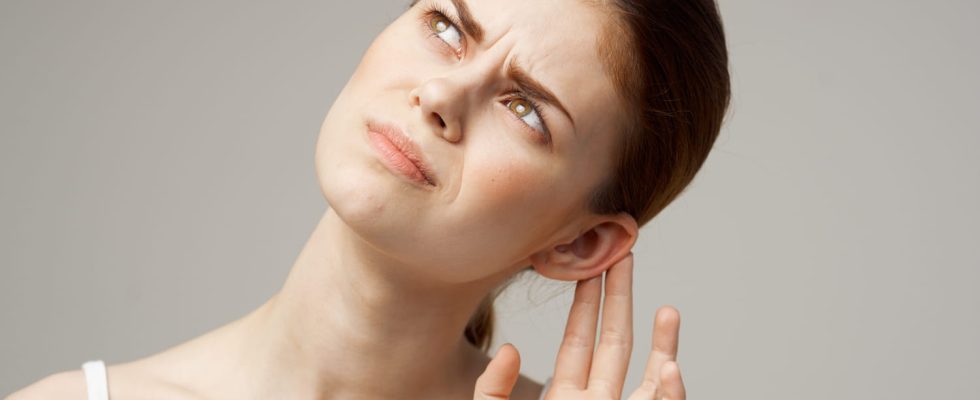Ringing in the ears, better known as tinnitus, is a very common symptom. Too loud music, hearing loss, ENT diseases, stress… Tour of the causes.
“The presence of ringing in the ears should bring to consult your doctor which will check if there is not a local cause which would be at the origin (wax plugs, variation in blood pressure…) and will refer to the ENT if necessary”, asks Dr. Didier Bouccara, ENT doctor. It has two axes to make the diagnosis: an eardrum examination to ensure that there is no inflammation and/or malformation, as well asaudiometrythat is to say a complete assessment of the hearing. “Depending on the results, he may prescribe additional examinations (radio, scanner or MRI) and treatment”he continues.
1. Progressive hearing loss (presbycusis)
Presbycusis is the most common cause of ringing in the ears reported in the general population. It designates the physiological and progressive reduction of hearing capacities related to age. Hearing loss is frequently associated with tinnitus. “It usually manifests from the age of 50 and worsens over time, causing progressive deafness in both ears. Treatment for hearing loss is based on the hearing aid. This device will naturally reduce tinnitus“, specifies the ENT.
2. Sound trauma
Ringing in the ears can be linked to sound trauma. “For example, they can be triggered at a concert, an evening with loud music, following an explosion or noises on construction sites“, illustrates Dr. Didier Bouccara. To avoid this phenomenon, it is important to protect yourself by wearing hearing protection in the event of exposure to loud noises, both in personal and professional life. “It is often a young audience that is affected by the ringing in the ears linked to excessive musical exposure. Hence the importance of taking part in prevention by encouraging them to lower the volume and wear earplugs at concerts. In addition, do not hesitate to consult an ENT in case of symptoms because it is possible to set up a treatment to reduce the risk of permanent damage to the inner ear.“, warns the specialist.
3. Meniere’s disease
Ringing in the ears can be linked to ear diseases such as: chronic otitis, earwax plug, perforation of the eardrum, a disease of the ossicles, a disease of the inner ear or even in very rare cases, a tumor of the auditory system. Among the diseases of the inner ear is the Meniere’s diseasethe best known of the hearing and balance disorders, which is characterized by attacks of vertigo, tinnitus and reduced hearing for low frequencies.
4. Pulsatile tinnitus
Pulsatile tinnitus is rare but warrants special care “Patients do not hear a buzzing and hissing noise but rather the sound of their heart ringing in the ear. This symptom warrants specialist evaluation as there may be particular underlying causes requiring management“, says Dr. Didier Bouccara.
5. Idiopathic ringing in the ears (without cause)
A small group of patients develop persistent tinnitus which is accompanied by significant psychological impact and sometimes depression. Ringing in the ears can especially appear in a context of stress and fatigue. “In the most severe forms, multidisciplinary care by ENT specialists, audioprosthetists, sophrologists and psychologists is offered to try to relieve the patient, even if the cause has not been identifiede“, underlines our interlocutor.
Thanks to Dr Didier Bouccara, ENT doctor
